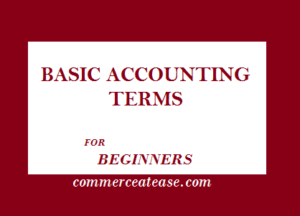 Basic Accounting Terms given here include all the important accounting terms that are necessary to understand the topics to be covered by any beginner to understand the subject of Accountancy.
Basic Accounting Terms given here include all the important accounting terms that are necessary to understand the topics to be covered by any beginner to understand the subject of Accountancy.
One thing is sure that if a student understands all these terms, he will be able to study this subject easily and happily.
Entity is the basic unit for which accounting records are to be prepared.
e.g. Mohan Garments, Ankit Bros., Tata Ltd.
Capital is anything (cash, bank balance, stock etc.) invested by the proprietor in his business.
Liability is the amount owed by the business to the outsiders.
e.g. Loans, creditors, bank overdraft, outstanding expenses, Income received in advance.
Asset is the property of the business.
e.g. Cash, bank, stock, debtors, bills receivable, land, plant and machinery, building, furniture, computer, transport vehicles, go-down.
Equity means claim on something. It can be owner's equity or creditor's equity.
Capital is called owner's equity and
Liability is called creditor's equity.
Assets can be fixed assets or Current assets.
Fixed assets are kept for doing the business and not for re-sale.
e.g. Land &building, plant& machinery, furniture.
Current assets are kept for running day to day activities of the business.
e.g. cash, bank, stock, debtors, bills receivable, prepaid expenses.
Assets can be tangible assets or intangible assets.
Tangible assets are assets with physical existence.
e.g. Land & building, plant& machinery, furniture.
Intangible assets are assets without physical existence.
e.g. Goodwill, copyrights, trademarks, patents.
Liabilities can be current or non-current.
Current liabilities are the liabilities to be paid within a period of one year.
e.g. bank overdraft, outstanding expenses, creditors, bills payable.
Non-Current liabilities, popularly known as long term liabilities are to be paid after one year.
e.g. Loans for long term, debentures issued.
Liabilities can be internal or external.
Internal liabilities are to be paid by the business to its proprietor.
e.g. capital.
External liabilities are to be paid by the business to the outsiders.
e.g. liabilities towards outsiders.
Revenues are the total receipts out of sale of goods and/or services by the business.
e.g. sale of goods and services sold.
Goods are the articles in which the business deals.
e.g. computers for computer dealer, furniture for furniture dealer.
Purchases are purchase of goods for use or for resale.
Expenses are the total costs incurred by the business to generate Revenues.
e.g. salaries, wages, rent, electricity charges, water charges, audit fees, stationery, conveyance charges .
Loss is reduction in owner's equity or capital due to any reason .
e.g. loss of furniture by fire, loss of goods by theft.
Income is increase in the capital due to any reason.
Profit is the excess of revenues over costs for the same accounting period.
Gain is profit of irregular and non-recurrent nature.
Accounting period is the normal period of twelve months for which accounting records are to be prepared.
e.g. It can be calendar year i.e.1st January to 31st December or government financial year i.e. 1st April to 31st March next year.
Drawings mean anything taken out of the business, by the proprietor for his private use.
e.g. cash taken for party celebration at home, goods taken for household use.
Debtors are the persons who have purchased goods or services from the business on credit and the payment is due from them.
Creditors are the persons from whom goods or services have been purchased by the business on credit and the payment is due to be made.
More Accounting Terms
Bills receivable is a credit instrument accepted by the debtor, against which the payment is to be received by the business on a future date.
Bills payable is a credit instrument accepted by the business, to be paid on a future date.
Depreciation is the permanent, gradual, decrease in the book value of a fixed asset due to its normal and continuous use.
Appreciation is the increase in the book value of assets.
Bad debts Debtors becoming irrecoverable become bad debts.
Insolvent Person not in a position to repay his liabilities is said to be insolvent.
Account is the summary of transactions relating to a particular item of the business.
Transaction is the event affecting the position of goods, services and assets, liabilities and capital.
Transaction may be:
Cash transaction affects the position of cash/ bank balance of the business i.e. increasing or/and decreasing cash or/and bank balance.
e.g. purchased goods for cash, sold goods payment received by cheque.
Credit transaction creates debtor-creditor relationship.
e.g. sold goods to Ankit on credit payment will be received after two months.
Non-cash Transaction affecting the business but not affecting the cash/bank/debtor/creditor etc.
e.g. charging depreciation on building, appreciation in the value of land.
Stock Goods remaining unsold are called stock or inventory.
e.g. furniture, cement, garments.
Outstanding expenses are the expenses due but not paid.
e.g. salaries outstanding, wages outstanding.
Prepaid expenses are the expenses paid in advance.
e.g. salaries prepaid, wages prepaid.
Accrued income is the income that has been earned but not received.
e.g. accrued commission, rent accrued.
Income received in advance is the income which has not been earned but has been received.
e.g. rent received in advance, commission received in advance.
Trade discount is the discount on quantity of sales or purchases.
Cash discount is the discount to encourage early payments/collection.
Now, try to Classify these Terms:
How to play this game?
You just have to drag the item to the selected category and tap there, it will show instant reaction, smiley if your selection is correct otherwise arrow will turn with red lining. After all selections, you get the score.
Test Your Understanding
